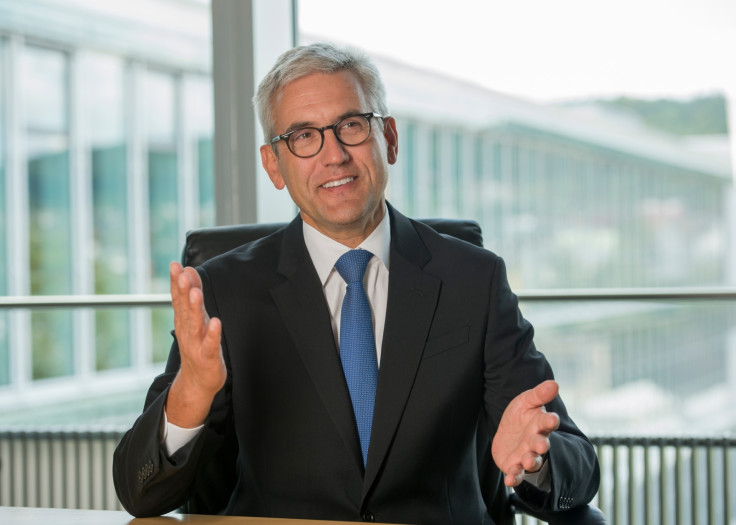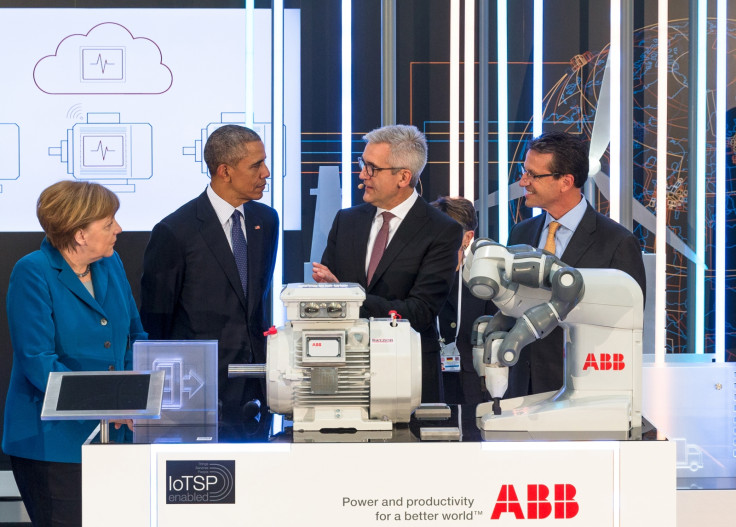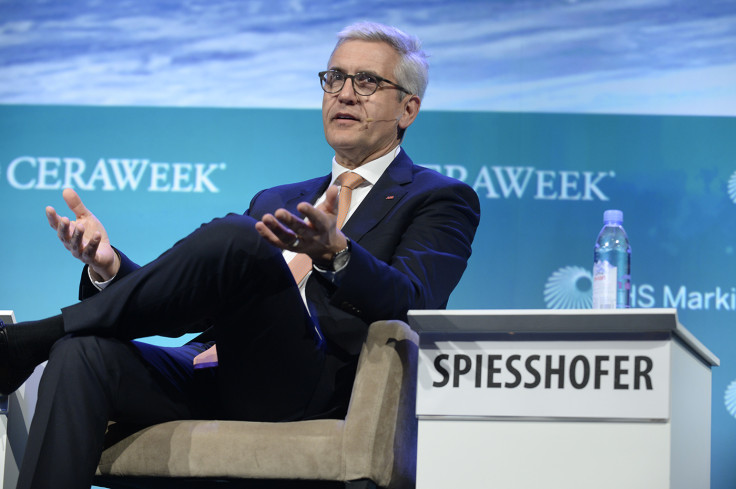Meet Ulrich Spiesshofer: CEO of ABB who champions AI and says taxing robots would be foolish
In an exclusive interview with IBTimes UK, the boss of automation giant says humankind is accelerating towards 'co-bots' not just robots.

When it comes to championing, or at times defending, the burgeoning world of modern day robotics and automation, Ulrich Spiesshofer, Chief Executive Officer of global industrial conglomerate ASEA Brown Boveri (ABB), certainly knows a thing or two about it.
From robotic claws shifting chassis in car plants to parts for turbines, transport systems to shop-floor automation, ABB is everywhere. In an exclusive wide-ranging interview with IBTimes UK, Spiesshofer says robots and automation play a vital role in the "betterment of humankind."
However, that noble corporate premise almost fell apart for ABB had it not been for the boss himself. In 2009/2010, the company's robotics unit was bleeding $300m (£207m) in operating losses, and contemplating its sale was the subject of boardroom discussions.
But cooler heads prevailed when Spiesshofer took the CEO's chair at the Fortune Global 500 company in September 2013 and diverted its robotics offering away from an overt emphasis on automakers.
The move paid off for the $50bn company that currently employs 135,000 people, as orders are on the rise. "In the past, the competition was to sell the cheapest kilogram of robot or an articulated arm to our customers. That mentality had to be changed, not our belief in the future of robotics.
"We shifted our focus from mere mechanical to more software-oriented holistic value addition products for customers. Out of the proceeds we are able to pool the funds to drive innovation and leadership in robotics.
"Today, we are at the forefront of Artificial Intelligence (AI), accuracy and monitoring, platforms in a digital factory, you name it. I am very proud of what the team has done. They deserve all the credit, it's not about me."
The company is transforming itself in a very significant way, says Spiesshofer. "The ABB of 2030 would be where the centre of gravity would have shifted significantly. We'll still need physicality, but articulation of the value preposition to our customers would be conceived on software and services activities. For instance, even today we already have 8 billion such activities, and counting."
That change was inevitable. "Historically it was copper and iron, then we added electronics, followed by software, and today ABB is a digital first organisation. We want to create an exciting future with a collaborative ecosystem in which we consciously start partnerships with software vendors, battery suppliers, and others, to target opportunities. ABB is accelerating towards 'co-bots' not just robots."
I, Robot, I 'Not' Taxpayer!
It takes a lot to unsettle the ABB boss, a trained yachtsman known in his social circles as an accomplished player of the clarinet, saxophone and accordion. One vexing issue, put to Spiesshofer by IBTimes UK is a call by some, including philanthropist Bill Gates, that robots should in fact be taxed to temper rapid automation and its impact on society.
Not commenting directly on the Microsoft founder turned supposed Luddite, the ABB boss queries with a deep frown whether we should then tax software as well? "Taxes should be always associated with the output, and I think that's a taxation system that has worked very well over the years. Robots enhance productivity, software does so too.
"If you compare robots with software, and all that's more productivity enhancing, then why don't we put taxes on software operations as well?
"Productivity and technology are good things if used in a wise way. I think what we need to do is look at the output and value added, taking that as the main basis of taxation, not indulge in talk about taxing robots," Spiesshofer adds with the calm of an economics professor, a discipline he has a PhD in.
More bits and petaflops, less nuts and bolts
Mankind is currently grappling with the fourth industrial revolution which is quite unique, according to the ABB boss. "This is the first time that technology isn't replacing muscle, rather complementing the brain. It means that technology and technological revolution is leaving the factory door and heading across all processes of an enterprise at an unprecedented pace."
That implies the pace of how we adapt has also quickened. "We need to be ready within a lifetime to unlearn our old jobs and get a new job. This has created a lot of anxiety in some sections of society, especially those who have not felt workplace changes in the past."
Spiesshofer feels if an automotive plant worker, who has worked with robots for 20 to 30 years, is asked about industrial change, the answer would be very different from his colleagues in the warranty department, where AI might be used to drive processes.

"Industry can't manage this change alone; governments, educational institutions and industry have to work together. If we do this right, we can create a lot of prosperity in the future. ABB for its part is re-skilling its people constantly and consciously. We take white collar back-office workers and retrain them for sales, we take machine operators [because machines can be automated], for service operations, and beyond."
"If you look at progress over the last 100 years, every industrial revolution has created wealth and jobs. Today, we have more people in employment around the world than ever before and a fraction of the people living below the poverty line compared to only 20 years ago."
Populism won't solve anything
Rise in populism remains a cause for concern for ABB. "I worry about peoples' anxieties being channelled into populism which in turn drives the political agenda. We have an obligation to create prosperity and wealth for our people and to look at the opportunities that technology offers. We should be able to reconcile that drive to progress and reshape employment in the 21<sup>st Century."
Spiesshofer says ABB supports multilateral collaboration and wishes the Brexit vote had not happened. However, the company has not decried the result as a cry in favour of protectionism by the British public.
"It seems the UK wants to set its own rules. The vote was clear and ABB as a company needs to respect that. The UK will remain a very important market for us. Since, we are totally committed to it; we'll find ways to make Brexit work in the long-term.
"I am apolitical. My wish is that London and Brussels come up with a predictable, reliable and workable framework so that trade barriers don't hurt our business or dent investment."
A year of transition and the road ahead
ABB's order pipeline – a gauge of future profit – rose 0.2% to $8.3bn in the three months to 31 December 2016, from the same period a year earlier. This appeared to be a healthy trajectory but then disaster struck.
On 22 February, the company announced that one of its employees in South Korea had embezzled $100m. The employee, named as treasurer Oh Myeong-se, is alleged to have forged documents and colluded with individuals outside ABB to steal the said amount, and is rumoured to have absconded to Hong Kong.
Interpol has been notified and an investigation by South Korean police is ongoing into what Spieshoffer describes as "a high amount criminality orchestrated by a single individual."
"The situation is very unpleasant. In keeping with my transparency pledge, first we had to check if this was a local issue or more farfetched, and thankfully it turned out to be the former. The investigation is ongoing, and we have engaged third party investigators in forensics of our own."
Spiesshofer says the company would not budge from its "zero tolerance" approach and is seeking redress. Shareholders believed in the sincerity with which ABB has responded and the revelation did not clobber ABB shares in New York and Zurich.

Away from the Korean embezzlement saga, global currency volatility of the last few years remains a cause for concern. "ABB has a strategy of natural hedging to balance off currency volatility. However, over the years we've made a conscious decision to be locally strong when it comes to manufacturing and operations in various markets. These also happen to the main hubs of key currencies like the yuan, dollar and euro and that helps."
Short-term concerns also persist about Europe, and it's not just down to Brexit. Hence, Spiesshofer expects a tough first half of 2017, an improved second half, and a much better 2018, by which time "policy direction from the new US administration would be clearer."
"Elsewhere, if you look at China, it's just reconfirmed growth ambitions which are lower but the agenda is a very strong one. The country's 13<sup>th five-year plan matches very, very well with ABB's capabilities. Finally, India, another important market is going strong."
Things are looking up by business segments as well. In the energy value chain, utilities account for a third of ABB's business. Both on the supply and demand side, with a push in favour of renewable energy and the proliferation of take-off points of electricity that include data centres and electric cars "cement an underlying growth dynamic that is quite positive" for ABB, says its boss.
Transportation and infrastructure, and oil and gas, ABB's other important business streams also hold prospects for good underlying growth, especially in 2018. Meanwhile, a $1bn efficiency savings drive, which the company initiated in 2016, remains on track.
Looking at the road ahead, Spiesshofer says he'll continue shaping the company together with his team "leading the transformation through, block by block" doubtless accompanied by the odd robot or two.
© Copyright IBTimes 2024. All rights reserved.






















